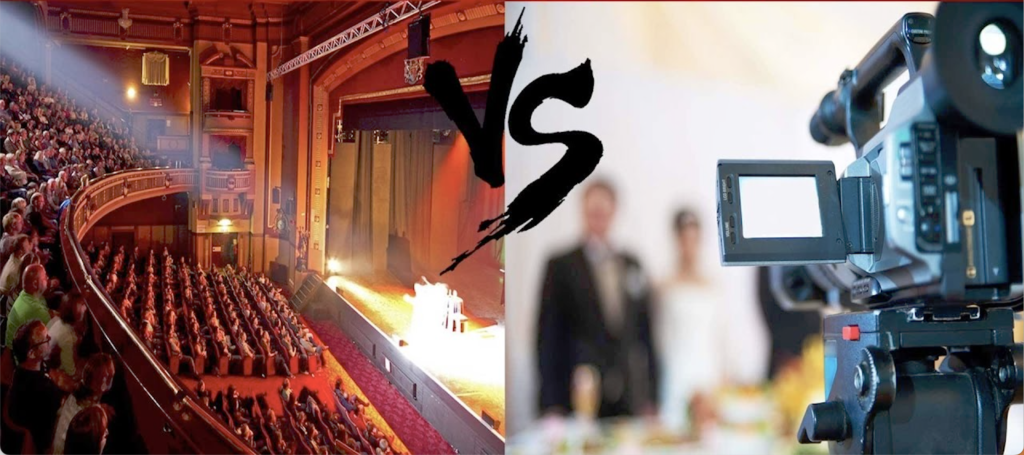I was in theater productions from middle school to university. I don’t really remember a time when I wasn’t acting on stage or taking acting classes. I was introduced to film acting during my sophomore year of college, and it opened a new world for me. Transitioning from stage to film acting was a challenge, but it was magical.
On stage, you’re required to “fill the room” with your presence. Bigger, grander, bolder gestures are encouraged. If you don’t project your voice, the audience members in the back rows may not be able to hear you, especially if you aren’t provided a microphone. In a black box theater, the distance may only be 30 feet. In theaters like the Gershwin Theatre in New York City, the distance is exponentially larger.
The biggest challenge for me when I went from stage to film was to stop projecting my voice. I didn’t start whispering by any means, but I started to speak at the normal volume I use on a day-to-day basis. On a film set, microphones will pick up the smallest of sounds – sighs, grunts, gasps – with little to no effort on the actor’s part. Whereas on stage, in order for the audience member in the back to see and hear the sighs and gasps, the movements are more exaggerated.
Another challenge in shifting from stage to film was figuring out what to do with my body in front of a camera. Depending on the scene, the camera will only capture a portion of the body. Other times, the camera will focus just on the face. We see this all the time in TV and film, especially in really intense scenes. This was distracting to me because the camera was close to my face, and I had to pretend like it wasn’t there. Oh, and there were about 100 crew members watching me.
But there were people watching me on stage, too, right? Yes, but the lights shining on me kind of blurred them out, which is why it was such an adjustment. On a film set, I was able to clearly see the crew around me and the camera next to me. On stage, I could focus on my scene partner and the props around me. The only thing that would pull me out of the “world” of the play or musical I was in was the laughter or applause from the audience, which leads me to my next point.
On stage, you hear the applause and laughter as you’re performing. You can feed off the audience’s energy. In the film, it’s “quiet on the set” while the cameras are rolling. And I mean quiet. You could hear a pin drop.
In theater, there’s always the possibility that someone’s phone will go off during a show or people will talk. This happens all the time and is to be expected, but the show must go on even with these disturbances.
In film, if someone’s phone goes off or if a plane flies by that is picked up on one of the actor’s mics, the actors get a do-over. And over and over and over. It can be tiring after a 12-hour day, but it gives you a chance to perfect the scenes. If you flub a line on stage or your voice cracks while singing, you’ve got to wait until the next show for your do-over.
Another adjustment from stage to film was the rehearsal process. On stage, there are weeks of rehearsal. In film, there’s often little or no rehearsal period. You must come to set with your lines memorized, and films are usually not shot in sequential order.
So, which is better? Stage or film? To me, they’re equal because I get to bring a character to life and tell a story. There are just different ways of going about it.
The one thing that has not changed in my experience in stage and film acting is the work. Acting takes a lot of work. Whether it’s on stage or screen, acting requires analysis and empathy in order to bring a character and story to life. Learning about a character’s backstory, their wants and needs, their relationships, and why they’re doing what they’re doing – that’s the challenge, and that’s the magic of acting.



